Friday July 17, 2015 Previous Post:
Big Meadows Campground Corbin Cabin in Nicholson Hollow-What a Day!
Shenandoah National Park
If you haven’t seen the first installment of this fantastic hike to the Corbin Cabin, you can find it and the surprise we saw on the drive to it at this link for PART 1. Part 2 will make more sense if you have read Part 1.
We are now dropping lower into the Hollow where we know the cabin can be found next to the Hughes River.





Although I believe these are chanterelles, I’m not positive so I’m not going to have them for dinner. But they are all along this trail. I also imagine it may be illegal to harvest mushrooms in the park. Either it is, or these aren’t chanterelles or they would be long gone by now in the numbers we' see them.





Probably Turkey Tail. This log is smothered in these brackets on one side.



This is one of my favorites and try as I might, I can’t find it anywhere including the National Audubon field Guide to North American Mushrooms

Our goal here wasn’t actually to do the park’s greatest mushroom walk but rather to see one of the most original cabins remaining in the park.
Those of you who have been reading these posts from Shenandoah National Park know that I have read nearly every book offered by the park on the former inhabitants and have a great deal of sympathy for them losing their homes and livelihood for those who did not wish to leave the park.
I have wanted to visit the Corbin Cabin since I read the first book. It is a solid chestnut log mountaineer cabin restored by PATC volunteers in the early 50’s. It can now be rented out for from $30 to $45 a night. The cabin is “primitive” meaning no water and outhouse. See PATC Cabins for more information.
I know we are getting closer when I begin to see remains of rock fences and foundations just off the trail.

Not sure you can see the far wall so I’ve put a red arrow above it.

We have no idea what this is for sure but the corners indicate some sort of building although the foundation is quite large. I’ve read that the remains of the John R. Nicholson Cabin are around here so perhaps this is it.

This appears to be a large stovepipe.

Some of the walls are quite tall. Taller than a foundation or most walls used for fencing.

And some are quite thick. Given the small rocks in the middle we wonder if it was a pile of stones removed for a field but the sides are straight. It’s not a pile. This is like a secret treasure hunt. We don’t know for sure what we’ve found.


There is a small body of water just beyond this structure. In spring and perhaps earlier times, it might have a great deal more water in it than it does now in July.

We cross over and continue on. More rock walls.


More chanterelles but who are theses cool purple guys?? Possibly versions of Viscid Violet Court?
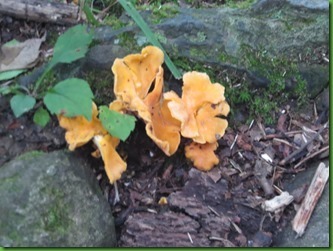



The trail has become covered over and over again with a mass of acorns. I wonder why no one wants these for dinner or to save up for the winter. Perhaps there are just so many of them or at this point other plentiful foods are more enticing.

We’ve been hearing the water of what we assume is the Hughes River and when it comes into sight we can see on the other side the cabin that was the goal of our hike. Can you see it? David’s got a smile on his face. He knows lunch is next!



True about lunch right over there, but first, I want to look on this side of the river for the ruins of another cabin that once belonged to Albert and Mamie Nicholson.


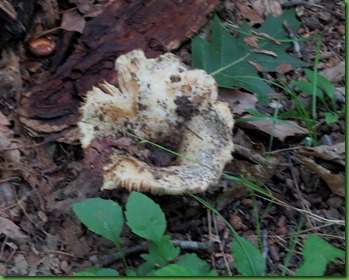

The trail to it is faint until you get nearer to the cabin.

The cabin is hidden in the trees to the right of the trail. The bottom level as rotted and the second story has fallen down onto the foundation. But what’s left is fairly intact and allows us to get a good idea of how it was originally constructed since it has not been “restored”.

This was once the second story.

Having dealt with an old farm house most of his life, David is quite interested in the details of how the cabin was built. It sits on the ground right on what we assume are turn of the 20th century or earlier chestnut logs. We are really glad the park service has left this one although I wish they had at least maintained it before the first floor was lost and do hope the entire thing won’t disappear into the forest over time.
\

Everything is solidly fitted and notched. I’m amazed at how it has held its shape when it dropped down if that’s what happened.
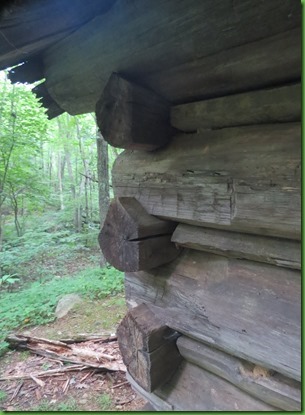

The outside was once covered with chestnut bark as siding.

That it has a tin roof shows that this mountain family was somewhat prosperous.

And now to cross the Hughes and see the Corbin Cabin up close.


The Corbin Cabin was built in 1909 by George T Corbin in Nicholson Hollow. Nicholson was forced to vacate the cabin in 1938 when the land it sits on was added to Shenandoah National Park. The cabin is unique in that it is one of a small number of buildings located in Nicholson Hollow that was spared during the creation of the park and still remains standing in spite of forest fires early in this century. The restoration has been kept as close as possible to the cabin’s original condition. The cabin is on the National Register of Historic Places.

It actually has two chimneys and two rooms with two entrances, one up the stairs into the kitchen with a wood stove and one into the main cabin room. A sleeping quarters is upstairs in the loft. As you can see, we were unable to even look inside.
Guess we’d have to rent it in order to take a look.

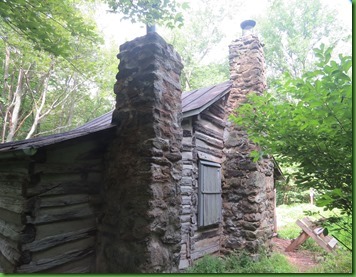

David stakes out a lunch spot on a perfect rock just beyond the cabin porch. The setting here is idyllic. The river sings in the background. I can’t imagine how Mr. Corbin could leave the place he lived from 1888 to 1938. Luckily James Madison University Library, over the mountain in Harrisonburg houses an oral history collection of interviews with 135 people who were living in the Shenandoah National Park Area prior to the creation of the park. I assume it would be possible to go there and listen to the interview. I think that would be wonderful.
George Corbin was interviewed in January of 1966. The description of the interview says the following:
"Corbin describes the circumstances at the time of the construction of the log cabin he built for his family in 1909. The logs for the cabin were harvested locally by Corbin, who then cut and shaped them using axes and other hand tools. Corbin recalls the day of the house raising when ten friends and neighbors joined him to assemble all of the walls and rafters within the course of a single day. He elaborates on local methods of raising and storing crops and vegetables, collecting tan bark, funerals and burial rituals, and gives a detailed account of his experiences distilling moonshine. Includes a discussion on the Corbin and Nicholson family cemetery, as well as the local schoolhouse and church. Mr. Corbin speaks at length of the genealogies of the Corbins and the Nicholsons, as well as many of the other local mountain families. Included are anecdotes regarding businessman and entrepreneur George Pollock, owner of Skyland resort, and several local residents"
While David is resting I take the trail up to the outhouse just to see what it looks like. It’s actually locked.



Fantastic view coming back from the privy. What a wonderful secluded place to live among such amazing beauty.

When I return I notice that David is sitting in front of a patch of wildflowers humming with activity.



Some of the locals are actually very interested in David and his gear. How about those eyes?

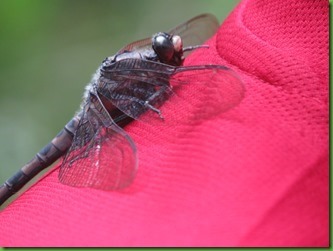




We have a wonderful peaceful lunch in this magnificent setting. But we still have the longest section of the trail to go yet as we head up the more gradual Nicholson Hollow Trail to return to Ruby. We say a reluctant goodbye to Corbin Cabin.
In order to have the record I want of all that we saw, I’m going to have to turn this one hike into a 3 part post. I took over 700 pictures and it has taken forever to go through them and cut it down to about 20% of those It will be interesting to see by the comments how many of my readers are as interested in mushrooms and these old buildings and ruins as we are. I will tell you we had a wonderful surprise at the very end of our day. And that’s in Part 3. :-)






























































